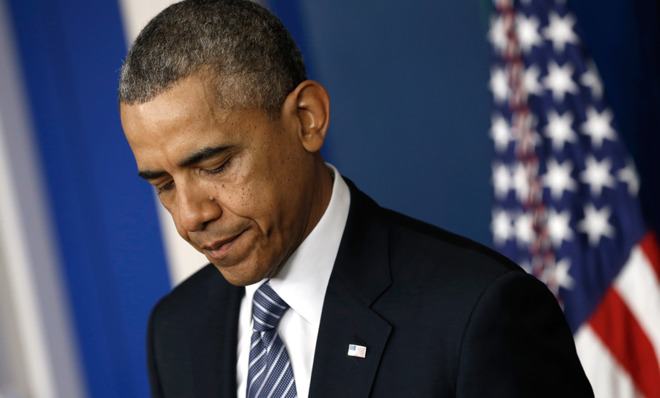Obama broke the law. He needs to admit it.


A free daily email with the biggest news stories of the day – and the best features from TheWeek.com
You are now subscribed
Your newsletter sign-up was successful
There are no bones about it: In trading five Taliban detainees at Guantanamo Bay for Sgt. Bowe Bergdahl, President Obama willfully broke a law. And this wasn't an old law, or a law that was passed before he became president. It was his law — or more accurately, successive versions of the military budget bill called the National Defense Authorization Act.
Now, Obama did not like the provision that required him to give Congress 30 days of notice before transferring detainees out of Guantanamo. And in a signing statement, he said as much: The executive branch's ability to defend the country shouldn't be constrained by the notification period. But the law's language was clear, as was Congress' intent. Here's the administration's explanation:
With respect to the separate 30-day notification requirement in Section 1035(d), the Administration determined that the notification requirement should be construed not to apply to this unique set of circumstances, in which the transfer would secure the release of a captive U.S. soldier and the Secretary of Defense, acting on behalf of the President, has determined that providing notice as specified in the statute could endanger the soldier’s life.
The Week
Escape your echo chamber. Get the facts behind the news, plus analysis from multiple perspectives.

Sign up for The Week's Free Newsletters
From our morning news briefing to a weekly Good News Newsletter, get the best of The Week delivered directly to your inbox.
From our morning news briefing to a weekly Good News Newsletter, get the best of The Week delivered directly to your inbox.
In these circumstances, delaying the transfer in order to provide the 30-day notice would interfere with the Executive's performance of two related functions that the Constitution assigns to the President: protecting the lives of Americans abroad and protecting U.S. soldiers. Because such interference would significantly alter the balance between Congress and the President, and could even raise constitutional concerns, we believe it is fair to conclude that Congress did not intend that the Administration would be barred from taking the action it did in these circumstances. [Just Security]
No. Congress' intent, on the contrary, was the opposite. Congress absolutely did want to constrain the president from using detainees to make national security policy decisions. No matter what circumlocution the administration hangs on to, it violated the law and the express will of Congress.
And I wish that Obama would admit it. I wish he would admit that he intended to break the law and then face the consequences.
It's very bad law. And it's a law that, from the administration's perspective, was ripe for the challenging. But the administration could not very well challenge a law it had signed. The notification delay probably would not pass constitutional muster for precisely the reasons spelled out by Obama's lawyers above, but since Obama had to sign the defense bill, he accepted the restrictions in order to get the money he asked for. Power-sharing, bargaining, democracy — all of that.
A free daily email with the biggest news stories of the day – and the best features from TheWeek.com
What can Congress do? What happens if the president breaks a law like this?
Nothing.
Congress could sue — but then what? The prisoners aren't coming back. There is no post-facto penalty. Congress never wrote one in. In the future, Congress might well try to impose a trigger on the president; if he violates the statutes, then certain mandatory funding Congress appropriates will be cut off. But beyond that, Congress is impotent.
Since his first term, Obama has thought that Congress has unreasonably held him back by preventing him from closing Guantanamo Bay.
There are two ways to think about this. One is that a law is a law, and Obama's assertion of his constitutional powers to ignore a provision of a law is equivalent to the same power reserved by President Bush. Both presidents should be condemned for violating the law, and perhaps even punished. (I certainly don't think Congress will ease up on Gitmo now.)
The second way of thinking starts with the premise that the law as passed was clearly unconstitutional, that there was no reasonable way for the president to challenge its constitutionality without abdicating his responsibilities as commander in chief, and so the least offensive course of action would be to ignore it. In this understanding, some laws are more important than others. Some laws are much more sacred than others.
The American Civil Liberties Union, by the way, takes the second view. The same ACLU that believes that the executive branch repeatedly violated the Constitution by following unconstitutional surveillance laws now believes that President Obama was correct in ignoring part of a law that was clearly unconstitutional.
This is not hypocrisy. It's simply an acknowledgment that procedural democracy is not always the best guarantor of justice, that the rule of law should never be agnostic to the consequences, especially when (subjectively) higher values are at stake.
Marc Ambinder is TheWeek.com's editor-at-large. He is the author, with D.B. Grady, of The Command and Deep State: Inside the Government Secrecy Industry. Marc is also a contributing editor for The Atlantic and GQ. Formerly, he served as White House correspondent for National Journal, chief political consultant for CBS News, and politics editor at The Atlantic. Marc is a 2001 graduate of Harvard. He is married to Michael Park, a corporate strategy consultant, and lives in Los Angeles.
